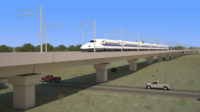The head of a company planning to build a high-speed passenger rail line between Dallas and Houston announced his departure from the effort, and the company's board of directors was recently disbanded, but those involved claim the plan is still moving ahead despite this and other setbacks.
The board of Texas Central Partners disbanded within the last month, says Richard Lawless, who had been chairman emeritus. He said he remains involved as a shareholder representative as the company is repositioned.
Carlos Aguilar, who had been president and CEO, announced that he had left the company in a LinkedIn post June 12 following reporting by Spanish business news outlet La Información that most of the company’s management team had left the project.
“While I could not align our current stakeholders on a common vision for a path forward, I wish the project the greatest success and remain convinced of the importance of this venture for the safety and prosperity of all Texans,” he wrote.
It was not immediately clear who would succeed Aguilar. For now, Lawless says the company is being managed by Michael Bui, a senior managing director at FTI Consulting who specializes in “liquidity forecast development, business plan development and analyses, collateral evaluations and recovery assessment and contingency planning,” according to his company biography, and who has advised various clients through events like distress, bankruptcy, reorganization and sale.
“Texas Central Partners LLC and its employees have been working with an experienced team at FTI Consulting for several months to continue the work on the innovative project to bring their high-speed passenger train line to Texas,” FTI said in a statement.
As ENR previously reported, the plans for the project call for construction of about 236 miles of track plus stations and other related equipment. The company has said it would take just 90 minutes to travel between Dallas and Houston on its high-speed service.
Last year, Texas Central announced the signing of a $1.6-billion contract with Kiewit Infrastructure South Co. and Mass. Electric Construction Co. for core electrical systems installation, and a $16-billion contract with The Lane Construction Corp. and Webuild to serve as design-build lead. Texas Central also announced Spanish train operator Renfe as the early operator for its planned railroad.
The proposal has faced several setbacks. As ENR previously reported, the company laid off nearly 30 employees in 2020, blaming the COVID-19 pandemic. The effort has also endured a years-long legal battle over its efforts to acquire land for the project. The case, which is currently before the Supreme Court of Texas, hinges on whether Texas Central counts as a “railroad company” under the state’s transportation code, which would determine whether it can use eminent domain to acquire land.
Texas Attorney General Ken Paxton has sided against the company’s use of eminent domain, and three U.S. representatives from Texas recently filed a brief supporting the landowners in their legal fight against the railroad. The court is expected to rule within the next several weeks.
“Mr. Aguilar’s departure does not have any effect on the pending appeal in the Texas Supreme Court,” Texas Central said in a statement. “It should not impact the timing of the court’s decision or the court’s ruling.”
Opponents of the plan have questioned Texas Central’s finances. Waller County Judge Trey Duhon, who is also president of the board of the group Texans Against High-Speed Rail, says the company appears to not have the money or resources to build the project.
Securities and Exchange Commission records show Texas Central Partners raised $75 million from private investors in 2015. In 2018, the Japan Bank for International Cooperation, agreed to loan up to $300 million to the company. In January, an attorney for Texas Central said during a court hearing that the company had raised more than $400 million.
Meanwhile, Texas Central’s projected cost of its plan has risen from $12 billion to $20 billion to $30 billion. In April, a court filing by officials from several counties said Texas Central was late paying more than $600,000 in property taxes. And while the company’s leadership had promised that the project would be fully privately funded last fall, when Aguilar appeared as a guest on a Texas politics podcast last fall, he said Texas Central may need to borrow $12 billion through a program funded by the Infrastructure Investment and Jobs Act.
“Now it looks like they’re pretty much dead in the water,” Duhon says. “The ship’s going down, and the captain is jumping ship.”
Even if Texas Central wins the court case, Duhon says the group may take the matter to lawmakers in order to prevent a company without an operating railroad in place from using eminent domain to obtain land for a railroad—something that could impact future efforts by others to start new rail companies.
“There should be more to it than just calling yourself a railroad,” he says. “In certain instances, private entities do have that authority and power [of eminent domain]. But those instances should be scrutinized, and they should be very tightly regulated.”






Post a comment to this article
Report Abusive Comment